Name: Rameez M Sydeek | Institution: University of Bristol, United Kingdom | Course: Master’s in Public Policy
Key Highlights
- Research on choosing a university should include subject ranking, overall university ranking, availability of scholarships, culture of the place, application fee and accommodation options
- Despite rigorous academic life, participation in extracurricular activities is important for an overall enriching experience in a foreign university
- Networking in the campus helps in personal growth and development
- Part-time jobs are not just good for the pocket but also for developing workplace soft skills
When Rameez M Sydeek was in school, he got an opportunity to visit the United Kingdom for a month as part of a cultural exchange programme. He was amazed by the country and culture, and at that moment, the 10th-grader dreamt of returning to study there. Fast forward, in 2023, he turned his dream into a reality by earning the Think Big Scholarship of £26000, which covered 98 percent of his tuition fee and a £3000 bursary towards living expenses from the University of Bristol International Scholarships for a Master’s in Public Policy. He joined the Think Big development programme as a Think Big Scholar. Exclusive to University of Bristol scholars, the programme enables students to develop themselves holistically beyond the academic support already provided by the University.
With a love for teaching Rameez had volunteered as a tutor for Amaara Foundation and Teach for India programme in India. After moving to the UK, he became associated with Jacari, a Bristol and Oxford charity providing free tutoring and extracurricular activities for migrant, asylum-seeking, and refugee children.
The master’s student from Kochi has already earned an unconditional offer for PhD in Social Policy at the School of Policy Studies, UoB. “Right now, I am looking into the various funding options available to be able to do my PhD,” Rameez tells Global Indian. The Kochi guy also won the Bristol PLUS award. “It’s the university’s career employability award given to less than five percent of the total students,” he mentions. Read about his experiences as an international scholar in the UK:
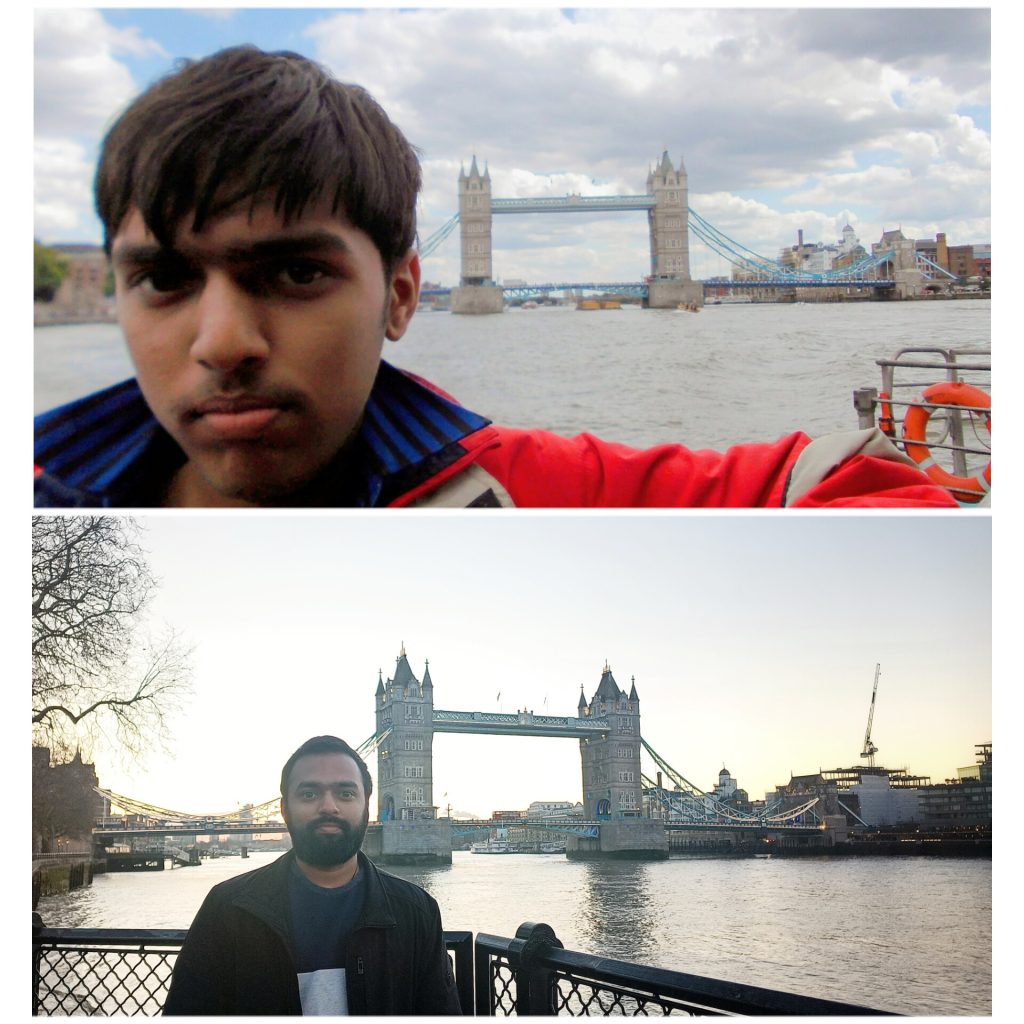
Rameez M Sydeek: Then and Now
Why did you choose to study at the University of Bristol?
Choosing the University of Bristol required much work. I spent a considerable amount of time researching several universities, looking at – their subject ranking, overall ranking, research options, availability of scholarships, the culture of the city and the application fees, among other factors. With thorough analysis I came up with my list of top five universities, and then decided UoB as my final choice. My subject, public policy’s ranking, the research institutes at the university and the culture of Bristol towards refugees, with whom I wanted to work, were the factors that won me over.
How is your academic life at the University of Bristol?
I have chosen refugees and the migration crisis, poverty and social exclusion and policy analysis as my core focus areas in my master’s. The programme is one of the best in the world, with excellent teaching staff and research institutes in the campus. The academic life here has been very different from how it was in my undergraduate and postgraduate studies back in India. No one will spoon-feed you here; we have everything to study and explore by ourselves, with the teachers acting as facilitators. A mix of lectures, seminars, readings, and research makes our academic life fruitful. My academic life has been focused on developing my knowledge, skills and mindsets along my subject lines.
Have you faced any challenges as an international scholar in the UK?
Initially, the only challenge that I faced was the time it took to get all the documentation done and get a part-time job. Since I have spent most of my life studying, working, and living outside my city Kochi, coming to another continent never felt like a significant change. Each day has been a new experience, and I have tried to make the most out the unique experiences.
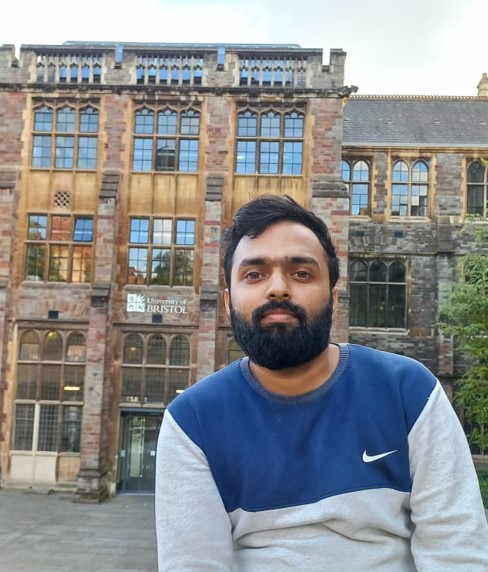
Rameez M Sydeek ay UoB campus
Are you interested in extracurricular activities?
I try to attend as many events as possible at the University of Bristol and even outside that to soak into unique cultural experiences. I also indulge in artwork and writing, go for long walks to explore the hidden stories in the unknown paths and use star maps to explore the sky. I love cooking because its therapeutic to me. Even with the time constraints that I face, I have tried out dishes from different cultures whenever possible.
Is finding an accommodation easy at Bristol?
It depends on the kind of accommodation you are looking for. The university offers guaranteed accommodation for all freshers provided they fulfil some criteria. This is the best option as this arrangement is comparatively cheaper than private accommodation, located in and around the university. Lots of travelling time gets saved too, this way. The rent within the campus covers all the utilities; while you will have to pay for everything separately in private accommodations. We have resources in the University to look out for private accommodations, but that too is a stressful process, and you might only get some of all the facilities you want at one place.
Did you experience any problem in settling in the new place?
No, I am happy I did not. I was open to adjusting to a new environment, right from the beginning. My accommodation at the university had some trivial maintenance issues, which I now consider inevitable. But other than that, it has been a smooth sail.
Have you managed to build connections and networks inside the campus?
Yes, building connections and networks has been a top priority for me. From the various networking events in and around the university, I made myself visible, increasing my connections and making people aware of my skills. My school has many networking events through which I built connections with teaching staff, research scholars and like-minded students. The various societies and the Global Lounge have also helped me create a web of connection beyond the policy field.
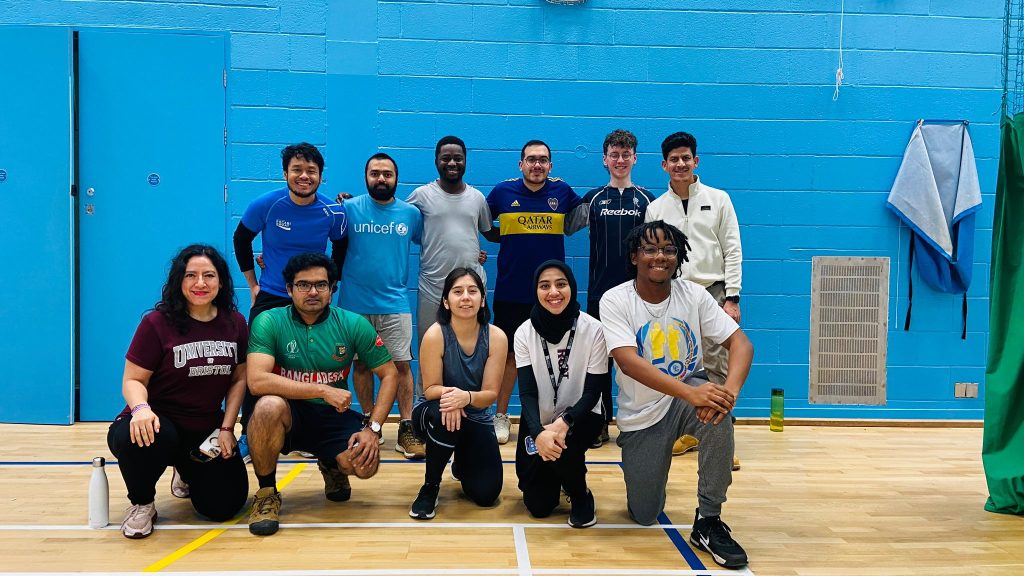
Rameez M Sydeek with friends
What has been some of the most interesting experiences as a UoB scholar?
I am an UoB’s Amnesty Society member through which I got the opportunity to know about Amnesty’s work in Bristol and the UK. It organises student-led conferences focussing on current issues – from the Palestine Genocide, the Rwanda Plan, and the Climate Crisis, through panel discussions and talks to workshops on tackling bias, craftivism and so on. In a paid (£5, which was pretty reasonable) event I got the opportunity to visit the headquarters of Amnesty which was my dream to visit since I had learned about Amnesty International as a school kid. Interacting with students and creating networks in that event was a very fulfilling experience.
Another interesting experience has been the opportunity to get elected as representative of one of the courses that had a strength of over 160 students, with 95 percent of the students from outside the UK. Playing a link between this diverse set of students, faculty and the university was a unique experience. Experiences like this one played a pivotal role in my getting the Bristol PLUS award.
Are you engaged in any part-time job?
You can only survive in the UK with a part-time job or good financial backing. It took me a couple of months, but I got a job as a night assistant at Waitrose, one of the supermarket chains in the UK. My work revolves around fulfilling the online orders and facelifting the shop for the next day. At the job I learned many new things like operating heavy machinery in a supermarket setting.
I work three nights a week during the term period and five nights during the vacations, and the experience has been enriching. I feel the skills like critical thinking, quick decision-making, and communication, I got to polish on the floor are assets to my overall development. This experience has also helped me meet people beyond the university. I also love the bus rides to the workplace and back, utilising the time for self-reflection.
How do you balance your studies, extracurriculars, and leisure time with a part-time job?
I have been quite flexible with my daily schedule, and that, along with the fact that my part-time is at night, made it easy. Initially, it wasn’t easy, but I could plan it out clearly once I got accustomed to it. I calendar everything to prioritise and plan out. I am in a new land for personal growth and consider all experiences as an opportunity to move forward in life.
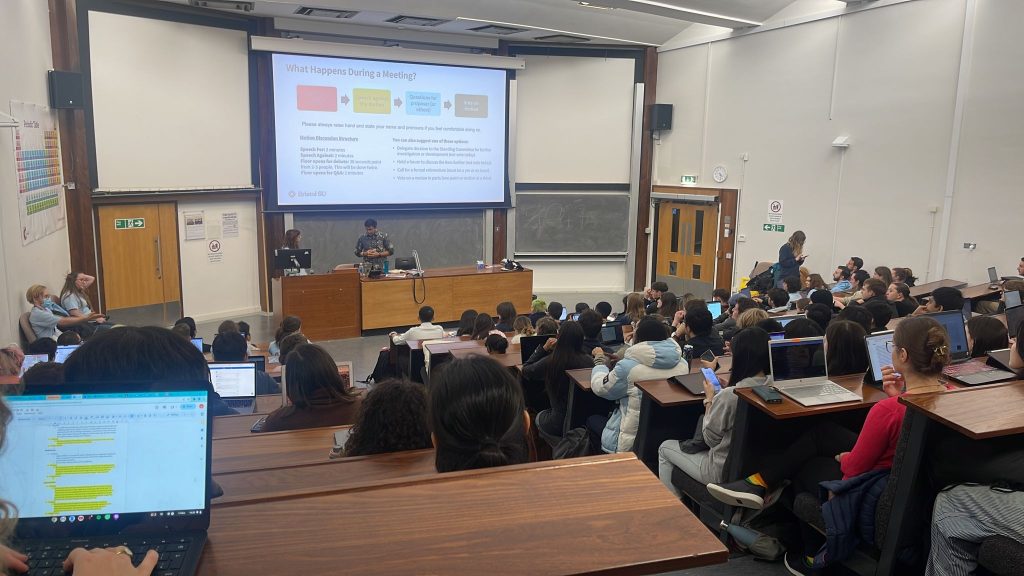
A students’ session in progress at University of Bristol
How did you secure an offer for PhD at UoB?
The refugee crisis is a sensitive topic, and I always wanted to do something about it. After a master’s in social work, my work with the Government of Kerala and Teach for India, and my second master’s in public policy, I think PhD is the next logical step for me. I spoke to many scholars and teachers before deciding to start my proposal. As a multicultural city, Bristol has a huge refugee population and many organisations working on this problem. The university has many ties with the community and has specialised research institutes. All these factors and my familiarity with the city now made me choose UoB as my destination for my PhD.
The opportunity to get associated with the non-profit Jacari in Bristol and teach English to high school refugee children as their additional language during the first term, and home tutoring during the second term helped me see things from their perspectives, and get insight into their hopes and dreams. I also indulged in extensive research and literature review before finally choosing inclusivity of refugee children through education in England as my research proposal for PhD.
The application process was pretty straightforward. I identified my supervisors, and once they showed interest in my proposal, I filled out the application form and took the interview which culminated into the offer.
- Follow Rameez M Sydeek on LinkedIn


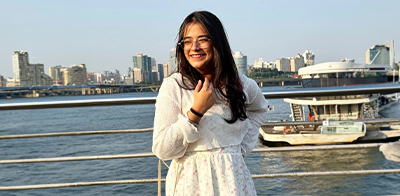


Allah fulfills your all dreams . Ummichi always pray for you.
Way to go, amigo
best of luck to you my senior and hope your paths cross again in the future.